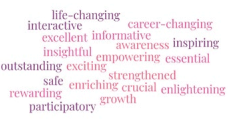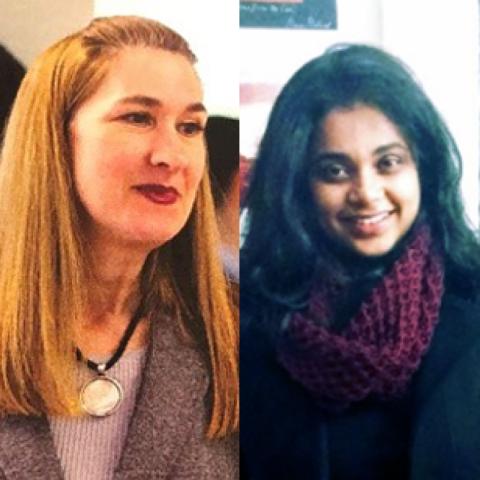
Bringing together a community of women leaders from across the UN System
The Leadership, Women and the UN Programme at the United Nations System Staff College (UNSSC).
DEBORAH RANDOLPH TALON, WHO
In January 2021, I had the opportunity to take part in the Leadership, Women, and the UN Programme offered by the UNSSC. It was at a juncture in my professional development where I wanted to scale up my responsibilities, but during which I also felt called to explore my interests and passions outside work, such as sports, micro-nutrition, and life coach training. Pursuing both goals to their fullest seemed close to impossible without making sacrifices in my personal life. I attended the Programme with the hope and expectation that it would provide me with the silver bullet to resolve this dilemma. Instead, it provided me with the space, the knowledge, and the skills to look inwards and define what alignment looked like for me. The Programme, therefore, felt like a breath of fresh air, and I invite you to read on to learn more about this leadership development journey.
The Beginning
The Leadership, Women, and the UN (LWUN) Programme was conceptualized and launched in 2015 by the UN System Staff College (UNSSC). The launch of the Programme coincided with the adoption of the 2030 Agenda for Sustainable Development, and was later reinforced by the System-wide Strategy on Gender Parity, both of which unequivocally call for ensuring women’s full and effective participation and equal opportunities for leadership. Since then, over 700 women leaders from across the UN System have gone through the Programme, which aims to expand, renew, and revitalize prevalent paradigms of what it means to be a leader, and thereby help build a more gender-balanced workplace across the UN System. When asked to summarize their programme experience in one word, participants said that this programme was:

”life-changing, interactive, career-changing, excellent, informative, awareness, inspiring, insightful, empowering, essential, outstanding, exciting, strengthened, safe, enriching, crucial, rewarding, enlightening, participatory, growth.”
As facilitators of this leadership development journey, it is our privilege to observe how each incoming cohort of exceptional women leaders exchanges and collaborates with one another and the faculty the culmination of which resembles a beautiful tapestry of hope, aspiration, determination, and the commitment to advance a more gender-sensitive and balanced workplace and culture.
Crafting the Tapestry
The tapestry that is co-created is made up of two interwoven threads: the first is the thread of thematic areas, concepts, and frameworks to support participants in elevating their leadership identity. The second thread, which intersects with the theoretical, is the personal – the lived experience and knowledge that the participants bring to the Programme. The latter expands to include new reflections, insights, and commitments that emerge from the Programme and are supported by leadership assessments and executive coaching.
The Programme begins with participants re-visualizing who a leader is, and what a leader does. Engaging in this process is critical, as, for a long time, leadership has been conflated with stereotypically ‘masculine’ traits. This process introduces participants to the idea of redefining leadership so that the representation incorporates ‘feminine’ traits and is rooted in purpose and values that match the realities and requirements of our rapidly changing environments.
“In order to foster change, you need the collective intelligence of all, at all levels, and as a leader you must be able to create a space where all this intelligence can express itself.” Participant, Fall 2020 Cohort
This is followed by a deep dive into how the dimensions of gender and culture interact to influence women’s leadership experiences, the challenges presented by these factors, and a collective conversation around how to navigate them and other actionable strategies. Next, the Programme explores how to communicate and influence by taking up one’s power and space with resolute presence. It then gives participants an opportunity to look inwards again – this time to plan and reflect on how they will live out their learning from this experience. As this tapestry is being woven, what emerges is the participants’ desire to effect change in three spheres – the individual, the community, and the organizational.
The Birth of a Sisterhood
Through discussions and conversations over the course of the Programme, participants develop deep empathy for one another. They realize that the challenges they have experienced while navigating their lives and careers are not uncommon and are a shared experience. A sisterhood emerges that can be seen in the micro-communities and networks that participants establish and lean on, even after they have formally completed the Programme.
“It was an eye opener. It made me realize that I am not alone.” Mona A., WHO, Spring 2021 Cohort
This also extends beyond just their cohort. The alumnae community is alive and vibrant, and in some cases Programme alumnae have formed additional networks. One such example is the International Organizations Women’s Network (IOWN) that was formed by participants from the Vienna-based organizations. Through this network, alumnae undertake advocacy for gender-sensitive and family-friendly policies and practices in their organizations. They also work to advance the promotion of gender equality and the achievement of equal representation of women working in the Vienna-based International Organizations, all the while providing the comfort of friendship and supportive relationships to each other. Sisterhood at its best!
Giving to Ourselves, as a Platform to Give Back
While participants appreciate how the Programme journey challenges them to stretch and extend their comfort zone, they also come to view it as an opportunity to give to themselves and engage in self-care — as a moment of pause before moving forward. The experience motivates participants to reflect on how they can share their learning and insights more widely. Alumnae often initiate structured interventions, such as brownbag lunches and mentoring younger women colleagues, to keep the Programme spirit alive. In March 2021, an alumna from Vanuatu collaborated with the Ministry of Health to organize its first-ever Women’s Day celebration, centered around the role of women in healthcare leadership. This was even more pertinent considering the Covid-19 pandemic. The event brought together stakeholders from the Ministry and development partner organizations. The deliberations helped reinforce the commitment to supporting women in Vanuatu’s healthcare sector. It was even agreed that International Women’s Day would be celebrated annually by the Ministry of Health, with a view to ‘promote women’s leadership in the health sector and beyond, towards a healthy and equal future in Vanuatu’. Alumnae also report how their colleagues and supervisors appreciate the shift in their management, communication, leadership styles, and the confidence and ease with which they bring together and lead their teams and take on projects.
“I became more empowered and aware of my role as a team leader. I have become more aware of what I need to do to embody a real leader in the UN system. That is what has been career-changing.” Bettina S., UNIDO, Fall 2020 Cohort
A Renewed Sense of Self
This confidence is also visible at the individual level, with participants reporting that the Programme helped reaffirm their view of themselves as leaders. More so, alumnae talk about experiencing the freedom to define what progression looks like for them so that it aligns with their sense of self. An impact assessment study conducted in 2018 showed that 76% of alumnae reported a career change,
“Excellent course indeed. It has made me start walking with my head high up, showing up and being seen! My leadership journey has already started.” Mutale N.S., WHO, Fall 2021 Cohort
with 19% reporting vertical progression and 57% reporting horizontal change. The affirmation and growth that the participants experience through the course of the Programme help set in motion a positive spiral of seeking more opportunities to exercise leadership and build capacity, thereby making their leadership identity more enduring.
In Conclusion
Since the Programme was established eight years ago, we have built a brilliant alumnae community that, as noted above, is committed to building truly inclusive cultures and leading change. As the Programme Team, we stay committed to nourishing this community and continuing to build on its legacy. In the words of activist Malala Yousafzai, “I raise up my voice – not so that I can shout, but so that those without a voice can be heard. We cannot all succeed when half of us are held back.” We hope to have provided you with a glimpse of our Leadership, Women, and the UN Programme experience, and the amazing women that have been part of and make this such a special journey. To learn more about the Programme, please write to us at: leadershipandmanagement@unssc.org. We look forward to hearing from you! Bridget C Harbaugh, Meher Joseph, and Marli Amorim (The UNSSC Leadership, Women and the UN Programme Team).
”… The experience ignited in me a new cause To create lasting impact, opened doors I thought closed … Faculty you’ve enabled us access to new altitudes Renewed our commitment, reinforced our fortitude To nurture more leaders as we serve the multitudes That’s our expression of extreme gratitude.” Excerpts from a poem written by Benta A., UN Regional Service Centre Entebbe, Fall 2021 Cohort
Published in the March 2022 issue of newSpecial.
